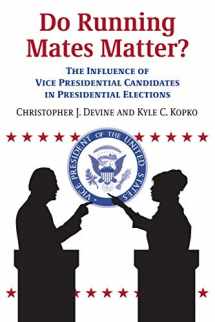
Do Running Mates Matter?: The Influence of Vice Presidential Candidates in Presidential Elections
Book details
Summary
Description
Review
"Through this engaging and thorough research, the authors deliver a critical examination of the impact of vice presidential nominees on electoral outcomes. Devine and Kopko provide a new foundation for future research to deepen our understanding of this complex relationship between voters, running mates, and the presidential nominees."--Congress & The Presidency
"This book offers the most complete assessment to date of how vice presidential candidates affect presidential elections."--Political Science Quarterly
"A rigorous, compelling analysis of the impact of running mate selection on voter decision making."--Perspectives on Politics
"This book builds on the authors' previous research on vice-presidential candidate selection and offers the single best work on the subject."--Choice
"Richard Nixon once famously claimed that vice presidential candidates cannot help presidential candidates, they can only hurt. In Do Running Mates Matter? Professors Devine and Kopko exhaustively test this and numerous other claims regarding the importance of vice presidential candidates in the electoral process. While others have worked at various aspects of this question over the past few decades, this work is a data-driven yet highly accessible scholarly tour de force. A must-read for students of the presidency and presidential elections."--Jody Baumgartner, coauthor of The American Vice Presidency: From the Shadow to the Spotlight
"Running mates matter, but in unexpected ways. Devine and Kopko provide the most comprehensive, multimethod examination of running mates to date. They convincingly demonstrate that the largest impact is from an evaluation of presidential candidates' decision-making process in the selection of vice presidential candidates."--Janet M. Box-Steffensmeier, Vernal Riffe Professor of Political Science, Ohio State University
The American vice presidency, as the saying goes, “is not worth a bucket of warm spit.” Yet vice presidential candidates, many people believe, can make all the difference in winning—or losing—a presidential election. Is that true, though? Did Sarah Palin, for example, sink John McCain’s campaign in 2008? Did Joe Biden help Barack Obama win? Do running mates actually matter? In the first book to put this question to a rigorous test, Christopher J. Devine and Kyle C. Kopko draw upon an unprecedented range of empirical data to reveal how, and how much, running mates influence voting in presidential elections.
Building on their previous work in The VP Advantage and evidence from over 200 statistical models spanning the 1952 to 2016 presidential elections, the authors analyze three pathways by which running mates might influence vote choice. First, of course, they test for direct effects, or whether evaluations of the running mate influence vote choice among voters in general. Next, they test for targeted effects—if, that is, running mates win votes among key subsets of voters who share their gender, religion, ideology, or geographic identity. Finally, the authors examine indirect effects—that is, whether running mates shape perceptions of the presidential candidate who selected them, which in turn influence vote choice. Here, in this last category, is where we see running mates most clearly influencing presidential voting—especially when it comes to their qualifications for holding office and taking over as president, if necessary. Picking a running mate from a key voting bloc probably won’t make a difference, the authors conclude. But picking an experienced, well-qualified running mate will make the presidential candidate look better to voters—and win some votes.
With its wealth of data and expert analysis, this finely crafted study, the most comprehensive to date, finally provides clear answers to one of the most enduring questions in presidential politics: can the running mate make a difference in this election?


We would LOVE it if you could help us and other readers by reviewing the book
Book review



